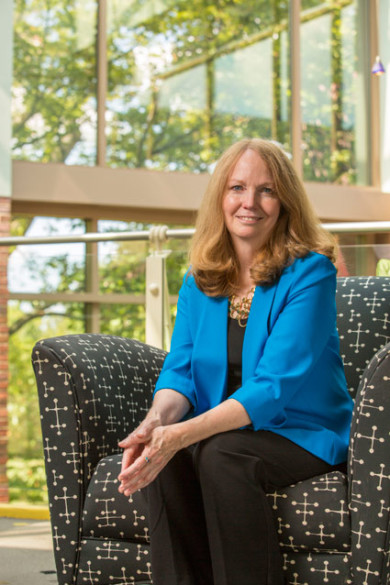
Katharine S. Brooks, a nationally recognized expert with more than 25 years of experience specializing in the career needs of college students and alumni, joined Vanderbilt in June as the Evans Family Executive Director of the Vanderbilt Career Center. Brooks developed the “Wise Wanderings” career coaching system, which is featured in her book, You Majored in What? Mapping Your Path from Chaos to Career. She also writes the Career Transitions blog for Psychology Today. Her expertise in career issues has been recognized in publications including The Wall Street Journal, The New York Times, U.S. News & World Report, The Chicago Tribune, The Philadelphia Inquirer, Business Insider, Cosmopolitan, the Associated Press, CNN and Fortune. She recently was listed as one of the “Ten Most Visionary Leaders in Career Services” by CSO Research and received the Kauffman Award from the National Association of Colleges and Employers for her service to the profession. She describes herself on Twitter (@KatharineBrooks) as “Career Coach/Consultant/Writer. Exec.Dir.@VUCareer. Liberal Arts advocate. @PsychToday blogger. Author@PlumeBooks. @MartinGuitar player.”
1. What are your goals here at Vanderbilt?
I want to help students develop their networks of possible wandering and fall in love with their future.
2. What brought you here?
This job sounded so interesting! I had never been to Nashville before, but I certainly knew Vanderbilt’s reputation. The big message for my career path is: “She didn’t plan to end up here, but she ended up exactly where she wants to be.” I’ve always looked at the job I had and thought, “What do I like about this job, and what don’t I like?” I’ve used that information to chart a career path focused on finding more of what I liked and less of what I didn’t, which is what brought me here.
3. Would you list your jobs after college?
Retail merchandising, HR management trainee, social worker supporting people who are blind, master’s degree in rehabilitation counseling, school psychologist, clinic director, Ed.D. in educational psychology, college counseling and placement staffer, disability services coordinator, film studies instructor, career center director (Dickinson College, University of Texas–Austin and Wake Forest), and now here.
4. How would you describe your approach to career counseling?
Chaos theory. It’s complex, not simple, and it’s certainly not linear. I call my approach Wise Wanderings, as in “not all who wander are lost.” Liberal arts majors, especially, can find it hard to determine their career, and I’ve found that wandering is a successful career strategy, particularly when it’s done with a purpose. The idea comes from Nobel Prize winner Herbert Simon, a founding father of artificial intelligence, who said in a biography that his career “was settled at least as much by drift as by choice.”
5. How does it work?
I ask students to take 15 minutes to draw a “wandering map” with all the things that are important to them—jobs, hobbies, traits—and to include all the possible lives and careers they’ve ever thought about doing. Then we look for themes and connections. Be prepared to be surprised.
6. I’ve got my map—what’s next?
Now you wander a bit. Sign up for a project, or try out an internship. Studying abroad is a great example. It opens horizons and broadens and builds skills. Notice I said “broaden” and not narrowing. That’s essential. Also think organically: Where do you get your energy? How do we get to do more of that? I tell students that finding out something they don’t like is just as good as finding out something they like. It’s all good information. Also, it’s important to not shut down ideas prematurely. You never know where you’re going to learn something.
7. How can you help students stand out in a crowded job market?
We use appreciative inquiry, which is a way of asking questions to help people find their own answers. Students can struggle with confidence, so we ask questions to get them to look at their strengths, such as “When you were at your all-time best, what did that look like?” Then we help students develop their story, their narrative. We look at their education, their experiences, how they got to where they are, and use this information to develop their narrative. You need that personal story to stand out to potential employers and to make them care about you.
8. When should students get started with the Career Center?
When they’re ready. For first-year students, this is a year of a lot of growth, and they need to let that happen. Concentrate on crafting your life at VU. It’s important not to get practical too early. Focus on the mindsets you enjoy—are you curious, analytical, strategic, positive—then go from there. Wander a bit. We are here to help you when you’re ready.
9. One last question. @MartinGuitar player?
I play guitar, banjo and hammered dulcimer. In Winston-Salem, I was a member of the Unbroken Circle, Wake Forest’s multigenerational string band. I’m always looking for an acoustic jam.